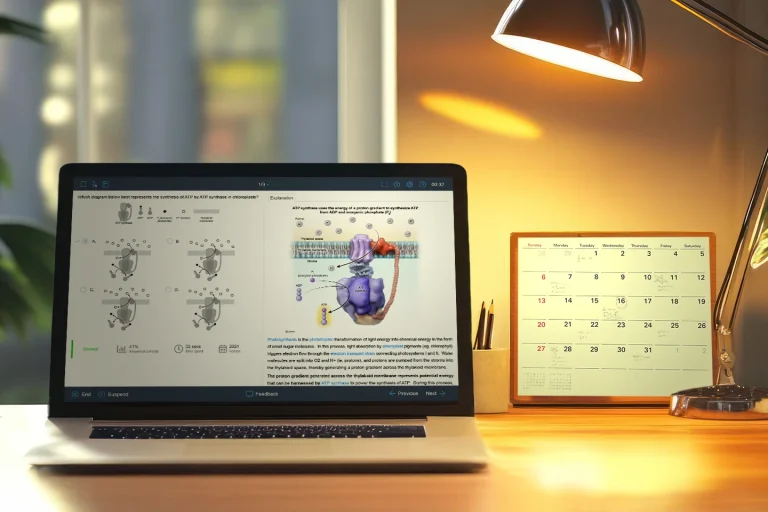When preparing for any AP exam, how you study is more important than how long you study. Here are tips and resources you can use to best prepare for your exams and achieve the highest scores possible.
Create an AP Exam Study Plan
How to study for AP exams effectively starts with creating a solid study plan. The earlier you begin, the more time you’ll have to practice strategies that can help you ace the tests. Ideally, start reviewing content 1 to 3 months before your exam, gradually transitioning from content review and practice questions to full-length practice exams as the test date nears.
When planning your study schedule, consider collecting and organizing material, reviewing concepts, and identifying areas that need more practice. These activities take time. Starting early allows for more relaxed daily study sessions and better material retention.
When establishing a study schedule, use the Course and Exam Description (CED) for each class as a guide. The CED organizes learning concepts into units. The easiest way to create a study plan is to split the number of units in the CED by the number of weeks you have to study, leaving time to practice AP-style questions along the way.
3 Months Before the Exam
If you have 3 months to study for an 8-unit course, plan to cover 1 unit from the CED weekly. Use the last month before your AP test to practice questions and take full-length practice exams. Plan on studying at least 1 to 2 hours daily for 3 days a week. Your study habits can increase or decrease the amount of time you need to study.
The benefit of this plan is that you have time to watch videos, make flashcards, practice AP-style questions, and relearn any concepts you struggle with to better prepare yourself for the exam.
1 Month Before the Exam
If you have 1 month to study for your AP exam, you will need to cover more units in a shorter amount of time while still allowing time to take a practice exam. For an 8-unit course, split the units over 3 weeks and give yourself 1 week to practice for the exam. If you can make the time, practice multiple-choice (MCQ) and free-response questions (FRQs) during the first 3 weeks of content review.
To get the most out of this plan, study at least 2 hours daily for 5 days a week.
2 Weeks Before the Exam
While 2 weeks to prepare for an AP exam is not ideal, you can make this timeframe work if you performed well on assessments throughout your classroom course and only need minimal content review. Plan on spending these 2 weeks practicing free-response questions and taking full-length practice exams. The questions you missed while practicing can determine the content review you need to focus on in the days before the exam.
To fully prepare for the AP exam on this study plan, you should study at least 4 hours daily for 5 days a week.
Review Your Study Habits
Study in a location with minimal distractions to help you focus. If you lose focus and cannot concentrate, take a break. Studying for 3 consecutive hours when you can only concentrate for 30 minutes at a time is not productive.
When you realize your study time is lacking productivity, take a break. Go for a walk, stretch, exercise, or grab a snack before trying again.
Here are some effective study tips for AP exams that can help you improve your study habits:
- Use proven study methods that have worked for you in the past instead of wasting time on those that haven’t worked.
- Don’t waste time on concepts you already understand.
- Teach peers in a study group or make diagrams visually representing a concept application and connection rather than memorizing content. This can boost your retention of the material.
- Practice the way you plan on testing on exam day. When taking timed tests, skip questions that take too long to answer, then go back and spend the necessary time on them at the end.
Organize Your Study Materials
Materials that will help you the most in your studies include the CED1, notes taken in class, old tests and quizzes, and review videos such as those found on AP Classroom or YouTube. Organize these materials in the unit order of the CED to easily match what is expected from you on the AP test.
Review CED Concepts
When reviewing concepts in the CED, it is best to use your past tests and quizzes to evaluate your knowledge of each concept. While it is important to refresh your memory on all the materials to be fully prepared for the AP exam, review the concepts you found difficult previously.
For these concepts, supplement the content from the CED and notes with materials not provided in class, such as YouTube videos posted by educators. Hearing the information differently may help you understand it better. If you take an AP exam without first taking the course, plan extra time in your study schedule to take notes from the review videos and take a practice exam to identify the concepts you need to focus on more.
Practice, Practice, Practice
Take at least 1 or 2 full-length practice tests before your exam date. One of the best study tips for AP exams is to replicate the test day experience as closely as possible. Here’s how to do that:
- Test yourself in a quiet environment where you will not be disturbed.
- Do not use any notes or information that will not be provided to you on exam day.
- Use a timer to take each section in the allotted time.
- Take breaks only between each section.
Review the concepts you missed after the first practice test before attempting another one. Through repeated practice, you can work on strategies to test more efficiently and focus your studying on the concepts and question types you find more difficult.
You can find free-response questions and practice tests for most subjects through College Board® or UWorld.
How To Study for AP Exams at Once
Learning how to study for AP exams effectively, especially when tackling multiple subjects, can be overwhelming. To stay organized and avoid burnout:
- Make sure to take a 1- to 2-day study break each week.
- Break up long sessions to increase focus while studying.
- Focus on one course at a time. Maybe you study for one AP exam during lunch and another after school or work. This method will help you focus better on a single subject and increase retention.
AP Exam Study Materials
When studying for your AP exams, use resources that will best prepare you to achieve the highest score possible. Here are a few resources to help you:
- Course and Exam Description (CED) The CED provides details, practice skills, and learning topics tested on the exam, including sample AP questions. It is an excellent resource for organizing your AP exam study plan and provides great content for making flashcards.
- Free-Response Questions The College Board provides free-response questions from previous years for each exam, scoring guidelines, and sample student responses. Practicing free-response questions with a study group can help you better understand the task verbs within each question and how to be more specific in your answers.
- UWorld AP Exam Prep UWorld allows you to create AP practice tests focused on the areas you must review most, providing exam-like practice questions for many AP topics. Every explanation has a visual representation of each learning topic, which you can also use to make digital flashcards for review.
Frequently Asked Questions (FAQs)
How long does it take to study for an AP exam?
The length of time it takes to study for an AP exam differs from student to student. Giving yourself more time to prepare and take practice tests is always better than cramming at the last minute. We recommend giving yourself 1-3 months to properly study for an AP exam.
What should I do the day before an AP exam?
Avoid last-minute cramming the day before your AP exam. Be well-rested and alert so that you perform your best. Make sure to eat a good breakfast, drink plenty of water, get enough sleep, and pack everything you will need for your exam the night before.
What should I bring to the AP exam?
On exam day2, bring #2 pencils with erasers for the multiple-choice question section and blue or black ink pens for the free-response question section. If your exam permits calculators, carry an approved calculator along with extra batteries. Pack water and snacks for breaks, dress comfortably, and bring a sweatshirt in case the testing room is cold. For a detailed checklist, visit our What to Bring on AP Exam Day page and check the official College Board guidelines for any additional recommendations.
References
1(2024). Course & Exam Pages. AP Central Retrieved February 26, 2024 from https://apcentral.collegeboard.org/courses
2(2024). What to Bring on AP Exam Day. AP Central Retrieved February 26, 2024 from https://apstudents.collegeboard.org/exam-policies-guidelines/what-to-bring-on-exam-day
Read More About AP Exams
Planning to take an AP exam? Discover which courses are challenging, how many to take, and the benefits of AP exams to help you make informed decisions.
AP Exam Schedule & DatesPrepare effectively for your AP exams! Discover all the details about the exam schedule, late-testing dates, & important timelines to stay on track for exam success.
AP CoursesYour ultimate guide to the most challenging AP courses. Learn what to expect and how to succeed in these rigorous academic programs.
AP Exam Eligibility & RegistrationGet ready for your AP exam! Learn how to register, what it costs, and the eligibility criteria to ensure a smooth registration process.
AP Exam ScoringUnderstand how your AP exams are scored, the score distribution, and how your results can benefit your college applications and future academic goals.
AP Exam Policies & AccommodationsStay updated on AP exam policies, guidelines, and accommodations. Learn how to navigate AP rules, what to bring for exam & ensure a seamless exam experience.






